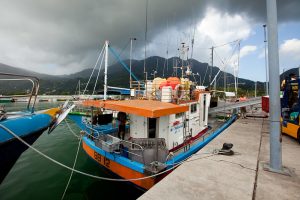In Seychelles, we investigate coastal communities’ views on the interactions and trade-off between small-scale fisheries with other sectors of ocean economies to achieve equitable, sustainable, and viable blue economy. These include commercial fisheries and aquaculture, ports and harbours, coastal tourism and oil and gas exploration.
Seychelles is one of six African Small Island Developing States (SIDS) made up of over 100 islands in the western Indian Ocean. In the context of the blue economy, Seychelles is leading the way by adopting a Blue Economy Roadmap in January 2018 and pioneering innovative financing tools for coastal and marine resources, particularly with the introduction of the world’s first blue bond in October 2018. The country’s marine-based economy depends heavily on fisheries and tourism. Small-scale fisheries of Seychelles play a critical role in supplying the local market demand, including hotels and restaurants (Glass, et al., 2022).
Despite the country’s progressive stance on ocean sustainability and blue economy, small-scale fishers in Seychelles are facing challenges posed by climate change, decline in relative abundance of fish populations within the Seychelles exclusive economic zone (EEZ), and pressures from commercial fishing (Christ et al., 2020; Robinson et al., 2011).
Our research in Seychelles aims to examine small-scale fishers understanding of ocean justice and learn their view on social, cultural, economic, regulatory, technology barriers and benefits to implementing blue economy programmes. To achieve these goals, we work close with small-scale fishers and their communities to co-produce alternative knowledge on ocean justice and blue economy and co-develop solutions needed to address their legitimate concerns.

